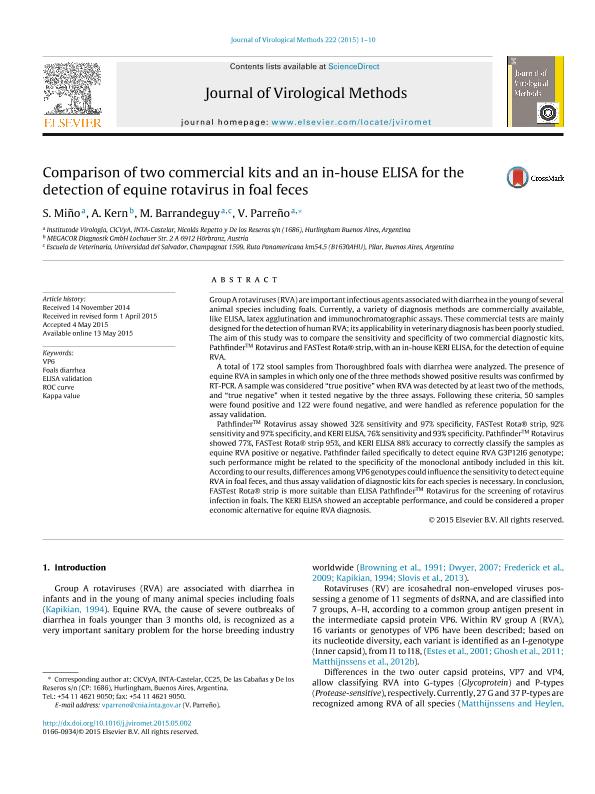Mostrar el registro sencillo del ítem
dc.contributor.author
Miño, Orlando Samuel

dc.contributor.author
Kern, A.
dc.contributor.author
Barrandeguy, M.
dc.contributor.author
Parreño, Gladys Viviana

dc.date.available
2020-03-01T19:56:17Z
dc.date.issued
2015-09
dc.identifier.citation
Miño, Orlando Samuel; Kern, A.; Barrandeguy, M.; Parreño, Gladys Viviana; Comparison of two commercial kits and an in-house ELISA for the detection of equine rotavirus in foal feces; Elsevier Science; Journal of Virological Methods; 222; 9-2015; 1-10
dc.identifier.issn
0166-0934
dc.identifier.uri
http://hdl.handle.net/11336/98599
dc.description.abstract
Group A rotaviruses (RVA) are important infectious agents associated with diarrhea in the young of several animal species including foals. Currently, a variety of diagnosis methods are commercially available, like ELISA, latex agglutination and immunochromatographic assays. These commercial tests are mainly designed for the detection of human RVA; its applicability in veterinary diagnosis has been poorly studied. The aim of this study was to compare the sensitivity and specificity of two commercial diagnostic kits, Pathfinder™ Rotavirus and FASTest Rota® strip, with an in-house KERI ELISA, for the detection of equine RVA.A total of 172 stool samples from Thoroughbred foals with diarrhea were analyzed. The presence of equine RVA in samples in which only one of the three methods showed positive results was confirmed by RT-PCR. A sample was considered "true positive" when RVA was detected by at least two of the methods, and "true negative" when it tested negative by the three assays. Following these criteria, 50 samples were found positive and 122 were found negative, and were handled as reference population for the assay validation.Pathfinder™ Rotavirus assay showed 32% sensitivity and 97% specificity, FASTest Rota® strip, 92% sensitivity and 97% specificity, and KERI ELISA, 76% sensitivity and 93% specificity. Pathfinder™ Rotavirus showed 77%, FASTest Rota® strip 95%, and KERI ELISA 88% accuracy to correctly classify the samples as equine RVA positive or negative. Pathfinder failed specifically to detect equine RVA G3P12I6 genotype; such performance might be related to the specificity of the monoclonal antibody included in this kit. According to our results, differences among VP6 genotypes could influence the sensitivity to detect equine RVA in foal feces, and thus assay validation of diagnostic kits for each species is necessary. In conclusion, FASTest Rota® strip is more suitable than ELISA Pathfinder™ Rotavirus for the screening of rotavirus infection in foals. The KERI ELISA showed an acceptable performance, and could be considered a proper economic alternative for equine RVA diagnosis.
dc.format
application/pdf
dc.language.iso
eng
dc.publisher
Elsevier Science

dc.rights
info:eu-repo/semantics/openAccess
dc.rights.uri
https://creativecommons.org/licenses/by-nc-sa/2.5/ar/
dc.subject
ELISA VALIDATION
dc.subject
FOALS DIARRHEA
dc.subject
KAPPA VALUE
dc.subject
ROC CURVE
dc.subject
VP6
dc.subject.classification
Ciencias Veterinarias

dc.subject.classification
Ciencias Veterinarias

dc.subject.classification
CIENCIAS AGRÍCOLAS

dc.title
Comparison of two commercial kits and an in-house ELISA for the detection of equine rotavirus in foal feces
dc.type
info:eu-repo/semantics/article
dc.type
info:ar-repo/semantics/artículo
dc.type
info:eu-repo/semantics/publishedVersion
dc.date.updated
2020-02-26T15:02:25Z
dc.journal.volume
222
dc.journal.pagination
1-10
dc.journal.pais
Países Bajos

dc.journal.ciudad
Amsterdam
dc.description.fil
Fil: Miño, Orlando Samuel. Instituto Nacional de Tecnología Agropecuaria. Centro de Investigación en Ciencias Veterinarias y Agronómicas. Instituto de Virología; Argentina
dc.description.fil
Fil: Kern, A.. Megacor Diagnostk; Austria
dc.description.fil
Fil: Barrandeguy, M.. Universidad del Salvador. Escuela de Veterinaria; Argentina. Instituto Nacional de Tecnología Agropecuaria. Centro de Investigación en Ciencias Veterinarias y Agronómicas. Instituto de Virología; Argentina
dc.description.fil
Fil: Parreño, Gladys Viviana. Instituto Nacional de Tecnología Agropecuaria. Centro de Investigación en Ciencias Veterinarias y Agronómicas. Instituto de Virología; Argentina. Consejo Nacional de Investigaciones Científicas y Técnicas; Argentina
dc.journal.title
Journal of Virological Methods

dc.relation.alternativeid
info:eu-repo/semantics/altIdentifier/url/https://www.sciencedirect.com/science/article/pii/S0166093415001792?via%3Dihub
dc.relation.alternativeid
info:eu-repo/semantics/altIdentifier/doi/http://dx.doi.org/10.1016/j.jviromet.2015.05.002
Archivos asociados
